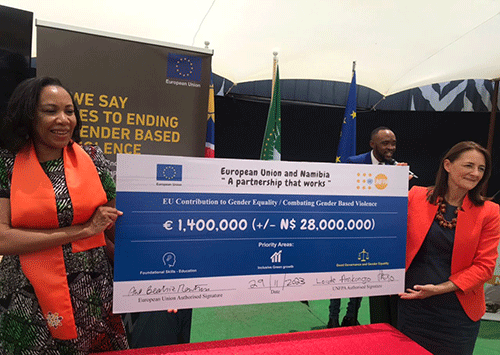The European Union delegation to Namibia and the United Nations Population Fund have initiated the “Combating Gender-Based Violence” campaign, and last week formally signed a contribution agreement in the Tobias Hainyeko constituency.
The contribution agreement, amounting to EUR 1 400 000 (approximately N$28 million), underscores a commitment to addressing the pervasive challenges faced by women and girls in Namibia.
Head of the EU delegation to Namibia, ambassador Beatriz Martins, outlined the programme’s careful design with clear objectives to reduce gender-based violence in targeted Namibian regions by 2027. The comprehensive approach draws insights from national health and gender-based violence information systems, along with recent studies highlighting gaps in addressing these issues.
She added that GBV remains unacceptably high, especially in some regions, where rates soar between 28% and 42%. Therefore, this project aims to reach in a concerted manner these vulnerable women and also to broader society, including parents/guardians; lawmakers and policymakers; service providers from the health, social, education and judiciary and law-enforcement sectors of both government and civil society; community leaders; the indigenous, and many more.
Furthermore, Namibia has shown commitment to closing the gender gap and address violence, as illustrated in Namibia’s laws, including the Married Persons Equality Act, Combating of Domestic Violence Act, Children’s Status Act, and the Combating of Rape Act and Maintenance Act; and by also developing a National Gender Policy and the National Prioritised Plan of Action on GBV. Nevertheless, there remains much more to do to address gender inequality in areas such as political representation, access to education, and employment opportunities.
“The challenges we face are multifaceted, rooted in socially-constructed gender roles, economic disparities and harmful cultural norms. This initiative recognises the need for a comprehensive, multi-level approach, involving national and sub-national institutions, civil society and communities. It aims not only to prevent gender-based violence, but also to protect the rights of women and girls to live free from violence,” she said.
Martins noted that the EU’s new Action Plan on Gender Equality 2020–2025, which is the main cornerstone of gender mainstreaming efforts, has identified gender equality, women’s empowerment, peace and security as cross-cutting issues to be included in all EU policies, strategies and projects. The EU will stay at the forefront of this international mobilisation to defend the rights of every woman and every girl to live free and safe.
Speaking at the launch, UNFPA Assistant Representative Loide Amkongo said this event represents a beacon of hope, initiating a partnership aimed at addressing one of the most pressing issues affecting the lives of individuals, particularly women and girls, in Namibia.
“The EU protects women and children from GBV through legislation, practical measures and financial support. Therefore, the EU’s generous contribution of EUR 1, 4 million, with the UNFPA’s commitment of EUR 140 000 for 36 months, underscores a shared dedication to combating gender-based violence at both the national and sub-national level,” she said.
She added that the strategic implementation of this programme will significantly impact many communities, specifically in the Zambezi, Ohangwena, Khomas, Kunene and Omaheke regions. These regions have been targeted to address critical gaps.
“Our heartfelt gratitude goes to the European Union for their commitment to uplifting the Namibian people, with a special focus on the well-being and empowerment of women and girls,” she noted.
Tobias Hainyeko constituency councillor Christopher Likuwa passionately called upon men in the Khomas region to register and participate in the upcoming men’s conference, scheduled for 4 December.
He shed light on the alarming victimisation of women in his community, underscoring the urgency for collective action in combating gender-based violence.
“Let’s all say no to GBV. Let’s protect our women, as they are harmless. We don’t want more women to report any cases of GBV,” he stated.
– priscillamukokobi@gmail.com


